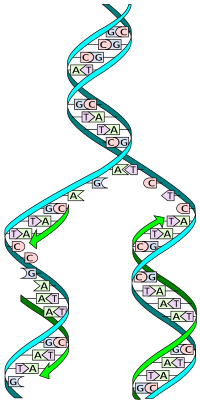Data replication as templates for Ruby ORMs.
DNA replication. The double helix is unwound and each strand acts as a template for the next strand. Bases are matched to synthesize the new partner strands.
Add this line to your application's Gemfile:
gem 'replication'
And then execute:
$ bundle
Or install it yourself as:
$ gem install replication
Extend Replication::Process in your models and declare it.
class Model
extend Replication::Process
can_replicate
endCustomize the 'pairs' method if you want.
class Model
extend Replication::Process
can_replicate :attributes_alias # default method is 'attributes'
endCustomize the class of the strands if you want.
class Model
extend Replication::Process
can_replicate strand_class: WeirdStrandClass
endYou can whitelist an array of attributes. They'll be replicated in the new strand.
can_replicate only: [:some_column, :other_column]You can blacklist an array of attributes. They'll not be replicated in the new strand.
can_replicate except: [:id, :name]To 'unwound' a strand, do:
model_instance = Model.new(attrs)
model_instance.unwound(name: 'The Original Model') # returns a new strandTo 'unwound' and save a strand, do:
model_instance = Model.new(attrs)
model_instance.replicate(name: 'The Original Model') # returns a new persisted strandTo be able to 'unwound' only when the object is valid, include Proofreading.
Right now it needs a valid? method to check.
class Model
extend Replication::Process
can_replicate with: :proofreading
end
model_instance = Model.new(invalid_attrs)
model_instance.unwound(name: 'The Original Model') # returns nil
model_instance.replicate(name: 'The Original Model') # raises UnwoundErrorTo initialize a object that's descendant from the strand of another object, do:
Model.new_from_strand([name or id])
# or
strand.replicateFor ActiveRecord strands, [:id, :created_at, :updated_at] will be blacklisted by default.
It's highly recommended that you save your model instances before trying to replicate, since it needs the 'id' and 'type' references for the association.
In some cases you don't want/won't need the strands to be associated, so, be free.
There's also a Association module, that is experimental and should be used with care. It uses the same parameters as the accepts_nested_attributes_for.
Model.can_replicate with: { associations: [:children, reject_if: :all_blank] }Migrations are be provided by:
rake replication_engine:install:migrations
- Add ActiveRecord inverse association: 'strands'.
- Refactoring, mainly about dependencies.
- Thorough testing.
- Scoping.
- More ORMs/ODMs.
- Fork it ( https://github.com/rodrigoddalmeida/replication/fork )
- Create your feature branch (
git checkout -b my-new-feature) - Commit your changes (
git commit -am 'Add some feature') - Push to the branch (
git push origin my-new-feature) - Create a new Pull Request

